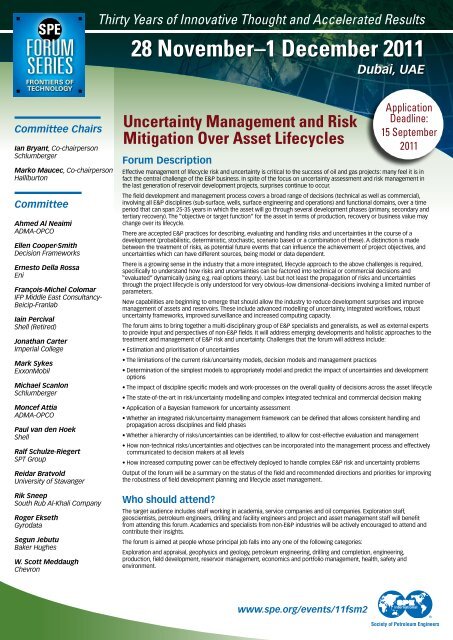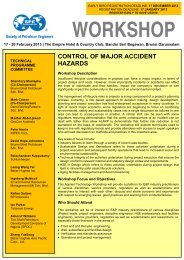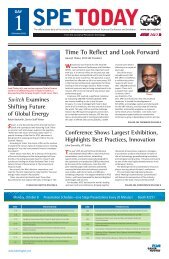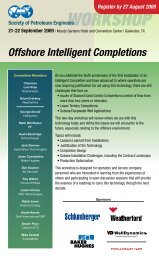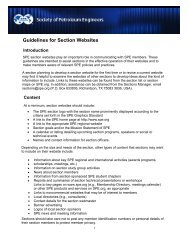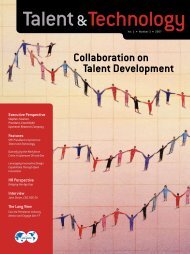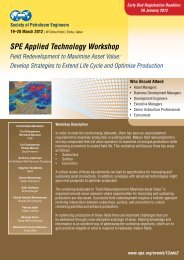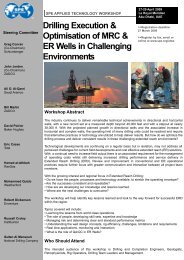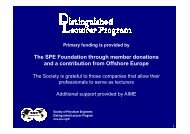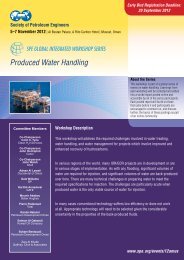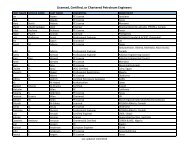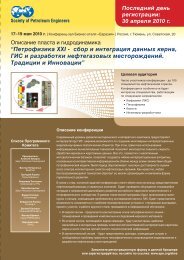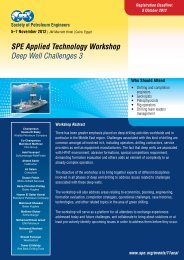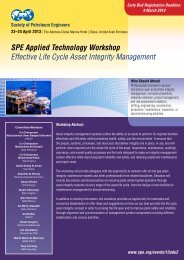Uncertainty Management and Risk Mitigation Over Asset Lifecycles
Uncertainty Management and Risk Mitigation Over Asset Lifecycles
Uncertainty Management and Risk Mitigation Over Asset Lifecycles
You also want an ePaper? Increase the reach of your titles
YUMPU automatically turns print PDFs into web optimized ePapers that Google loves.
Committee Chairs<br />
Ian Bryant, Co-chairperson<br />
Schlumberger<br />
Marko Maucec, Co-chairperson<br />
Halliburton<br />
Committee<br />
Ahmed Al Neaimi<br />
ADMA-OPCO<br />
Ellen Cooper-Smith<br />
Decision Frameworks<br />
Ernesto Della Rossa<br />
Eni<br />
François-Michel Colomar<br />
IFP Middle East Consultancy-<br />
Beicip-Franlab<br />
Iain Percival<br />
Shell (Retired)<br />
Jonathan Carter<br />
Imperial College<br />
Mark Sykes<br />
ExxonMobil<br />
Michael Scanlon<br />
Schlumberger<br />
Moncef Attia<br />
ADMA-OPCO<br />
Paul van den Hoek<br />
Shell<br />
Ralf Schulze-Riegert<br />
SPT Group<br />
Reidar Bratvold<br />
University of Stavanger<br />
Rik Sneep<br />
South Rub Al-Khali Company<br />
Roger Ekseth<br />
Gyrodata<br />
Segun Jebutu<br />
Baker Hughes<br />
W. Scott Meddaugh<br />
Chevron<br />
Thirty Years of Innovative Thought <strong>and</strong> Accelerated Results<br />
28 November–1 December 2011<br />
Dubai, UAE<br />
<strong>Uncertainty</strong> <strong>Management</strong> <strong>and</strong> <strong>Risk</strong><br />
<strong>Mitigation</strong> <strong>Over</strong> <strong>Asset</strong> <strong>Lifecycles</strong><br />
Forum Description<br />
Effective management of lifecycle risk <strong>and</strong> uncertainty is critical to the success of oil <strong>and</strong> gas projects: many feel it is in<br />
fact the central challenge of the E&P business. In spite of the focus on uncertainty assessment <strong>and</strong> risk management in<br />
the last generation of reservoir development projects, surprises continue to occur.<br />
The field development <strong>and</strong> management process covers a broad range of decisions (technical as well as commercial),<br />
involving all E&P disciplines (sub-surface, wells, surface engineering <strong>and</strong> operations) <strong>and</strong> functional domains, over a time<br />
period that can span 25-35 years in which the asset will go through several development phases (primary, secondary <strong>and</strong><br />
tertiary recovery). The “objective or target function” for the asset in terms of production, recovery or business value may<br />
change over its lifecycle.<br />
There are accepted E&P practices for describing, evaluating <strong>and</strong> h<strong>and</strong>ling risks <strong>and</strong> uncertainties in the course of a<br />
development (probabilistic, deterministic, stochastic, scenario based or a combination of these). A distinction is made<br />
between the treatment of risks, as potential future events that can influence the achievement of project objectives, <strong>and</strong><br />
uncertainties which can have different sources, being model or data dependent.<br />
There is a growing sense in the industry that a more integrated, lifecycle approach to the above challenges is required,<br />
specifically to underst<strong>and</strong> how risks <strong>and</strong> uncertainties can be factored into technical or commercial decisions <strong>and</strong><br />
“evaluated” dynamically (using e.g. real options theory). Last but not least the propagation of risks <strong>and</strong> uncertainties<br />
through the project lifecycle is only understood for very obvious–low dimensional–decisions involving a limited number of<br />
parameters.<br />
New capabilities are beginning to emerge that should allow the industry to reduce development surprises <strong>and</strong> improve<br />
management of assets <strong>and</strong> reservoirs. These include advanced modelling of uncertainty, integrated workflows, robust<br />
uncertainty frameworks, improved surveillance <strong>and</strong> increased computing capacity.<br />
The forum aims to bring together a multi-disciplinary group of E&P specialists <strong>and</strong> generalists, as well as external experts<br />
to provide input <strong>and</strong> perspectives of non-E&P fields. It will address emerging developments <strong>and</strong> holistic approaches to the<br />
treatment <strong>and</strong> management of E&P risk <strong>and</strong> uncertainty. Challenges that the forum will address include:<br />
• Estimation <strong>and</strong> prioritisation of uncertainties<br />
• The limitations of the current risk/uncertainty models, decision models <strong>and</strong> management practices<br />
• Determination of the simplest models to appropriately model <strong>and</strong> predict the impact of uncertainties <strong>and</strong> development<br />
options<br />
• The impact of discipline specific models <strong>and</strong> work-processes on the overall quality of decisions across the asset lifecycle<br />
• The state-of-the-art in risk/uncertainty modelling <strong>and</strong> complex integrated technical <strong>and</strong> commercial decision making<br />
• Application of a Bayesian framework for uncertainty assessment<br />
• Whether an integrated risk/uncertainty management framework can be defined that allows consistent h<strong>and</strong>ling <strong>and</strong><br />
propagation across disciplines <strong>and</strong> field phases<br />
• Whether a hierarchy of risks/uncertainties can be identified, to allow for cost-effective evaluation <strong>and</strong> management<br />
• How non-technical risks/uncertainties <strong>and</strong> objectives can be incorporated into the management process <strong>and</strong> effectively<br />
communicated to decision makers at all levels<br />
• How increased computing power can be effectively deployed to h<strong>and</strong>le complex E&P risk <strong>and</strong> uncertainty problems<br />
Output of the forum will be a summary on the status of the field <strong>and</strong> recommended directions <strong>and</strong> priorities for improving<br />
the robustness of field development planning <strong>and</strong> lifecycle asset management.<br />
Who should attend?<br />
The target audience includes staff working in academia, service companies <strong>and</strong> oil companies. Exploration staff,<br />
geoscientists, petroleum engineers, drilling <strong>and</strong> facility engineers <strong>and</strong> project <strong>and</strong> asset management staff will benefit<br />
from attending this forum. Academics <strong>and</strong> specialists from non-E&P industries will be actively encouraged to attend <strong>and</strong><br />
contribute their insights.<br />
The forum is aimed at people whose principal job falls into any one of the following categories:<br />
Exploration <strong>and</strong> appraisal, geophysics <strong>and</strong> geology, petroleum engineering, drilling <strong>and</strong> completion, engineering,<br />
production, field development, reservoir management, economics <strong>and</strong> portfolio management, health, safety <strong>and</strong><br />
environment.<br />
www.spe.org/events/11fsm2<br />
Application<br />
Deadline:<br />
15 September<br />
2011<br />
Society of Petroleum Engineers


